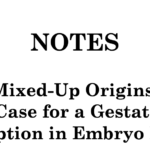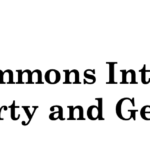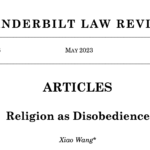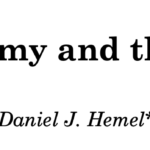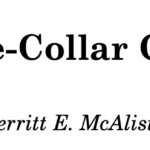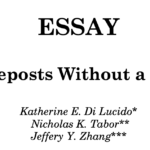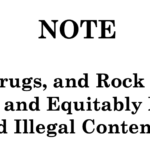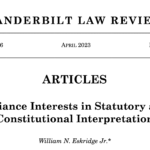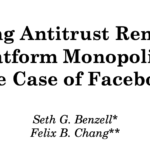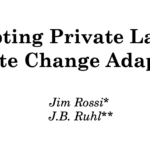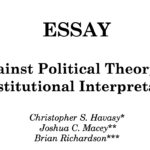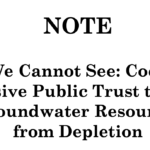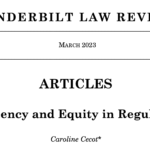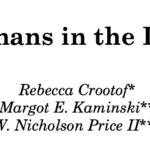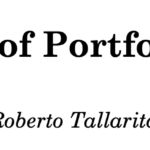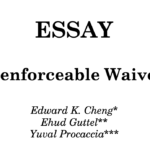Volume 76 Category
Mixed-Up Origins: The Case for a Gestational Presumption in Embryo Mix-Ups
Oct. 6, 2023—Betsy Anne Sugar | Vand. L. Rev. 1521 Embryo mix-ups—instances in which fertility clinics mistakenly implant one couple with another couple’s embryo—confound courts’ determinations of who, between the two couples, are the legal parents. Lax regulation of the fertility industry permitted this relatively new injury to develop, and it has led to morally and legally...
The Anticommons Intersection of Heirs Property and Gentrification
Oct. 6, 2023—Emma Ruth White | 76 Vand. L. Rev. 1561 Throughout history, internal and external pressures on Black landowners have resulted in the fragmentation of ownership through heirs property. This fragmentation is analogous to the erosion of community ties within minoritized neighborhoods susceptible to gentrification. Both contexts contribute directly to involuntary exit and land loss within...
Religion as Disobedience
May. 31, 2023—Xiao Wang | 76 Vand. L. Rev. 999 Religion today offers plaintiffs a ready path to disobey laws without consequence. Examples of such disobedience abound. In the past few years alone, courts have enjoined vaccine mandates, invalidated stay-at-home orders, and set aside antidiscrimination laws protecting same-sex couples. During the 2021–2022 Term, plaintiffs relied once again...
Polysemy and the Law
May. 31, 2023—Daniel J. Hemel | 76 Vand. L. Rev. 1067 Polysemy—the existence of multiple related meanings for the same word or phrase—is a frequent phenomenon in legal and lay language. Although polysemy sometimes arises by accident, it also can be strategic: framers of legal rules can advance private and public interests by assigning meanings to terms...
White-Collar Courts
May. 31, 2023—Merritt E. McAlister | 76 Vand. L. Rev. 1155 Article III courts are white-collar courts. They are, scholars have said, “special.” They sit atop the judicial hierarchy, and they are the courts of the one percent. We inculcate that sense of specialness in a variety of ways: federal courts are courts of limited jurisdiction; they...
Fenceposts Without a Fence
May. 31, 2023—Katherine E. Di Lucido, Nicholas K. Tabor & Jeffery Y. Zhang | 76 Vand. L. Rev. 1215 Banking organizations in the United States have long been subject to two broad categories of regulatory requirements. The first is permissive: a “positive” grant of rights and privileges, typically via a charter for a corporate entity, to engage...
Sex, Drugs, and Rock & Roll: Effectively and Equitably Moderating Vice and Illegal Content Online
May. 31, 2023—Elise Nicole Blegen | 76 Vand. L. Rev. 1265 The modern internet is vast, with more than 2.5 quintillion bytes of data created every day. Content is created, uploaded, downloaded, and shared across an increasingly large number of platforms. Most of this content is legal; however, some is illegal, including hate speech, child sexual abuse...
Reliance Interests in Statutory and Constitutional Interpretation
Apr. 26, 2023—William N. Eskridge Jr. | 76 Vand. L. Rev. 681 People and companies rely on public law when they plan their activities; society relies on legal entitlements when it adapts to new technology, economic conditions, and social groups; legislators, administrators, and judges rely on settled law when they pass, implement, and interpret statutes (respectively). Such...
Evaluating Antitrust Remedies for Platform Monopolies: The Case of Facebook
Apr. 26, 2023—Seth G. Benzell & Felix B. Chang | 76 Vand. L. Rev. 773 This Article advances a framework to assess antitrust remedies and policy interventions for platform monopolies. As prosecutors and regulators barrel forward against digital platforms, soon it will fall upon courts and administrative agencies to devise remedies. We argue that any sensible solution...
Adapting Private Law for Climate Change Adaptation
Apr. 26, 2023—Jim Rossi & J.B. Ruhl | 76 Vand. L. Rev. 827 | The private law of torts, property, and contracts will and should play an important role in resolving disputes regarding how private individuals and entities respond to and manage the harms of climate change that cannot be avoided through mitigation (known in climate change...
Against Political Theory in Constitutional Interpretation
Apr. 26, 2023—Christopher S. Havasy, Joshua C. Macey & Brian Richardson | 76 Vand. L. Rev. 899 Judges and academics have long relied on the work of a small number of Enlightenment political theorists—particularly Locke, Montesquieu, and Blackstone—to discern meaning from vague and ambiguous constitutional provisions. This Essay cautions that Enlightenment political theory should rarely, if ever,...
Water We Cannot See: Codifying a Progressive Public Trust to Protect Groundwater Resources from Depletion
Apr. 26, 2023—Susan Emily Ness | 76 Vand. L. Rev. 953 Groundwater provides a vital water supply and plays an integral role in hydrological systems by supporting biodiversity and the overall health and functioning of surface waters. Yet, the current legal landscape in the United States premises groundwater management on outdated scientific understandings of hydrology and fails...
Efficiency and Equity in Regulation
Mar. 28, 2023—Caroline Cecot | 76 Vand. L. Rev. 361 The Biden Administration has signaled an interest in ensuring that regulations appropriately benefit vulnerable and disadvantaged communities. Prior presidential administrations since at least the Reagan Administration have focused on ensuring that regulations are efficient, maximizing the net benefits to society as a whole, without considering who benefits...
Humans in the Loop
Mar. 28, 2023—Rebecca Crootof, Margot E. Kaminski & W. Nicholson Price II | 76 Vand. L. Rev. 429 From lethal drones to cancer diagnostics, humans are increasingly working with complex and artificially intelligent algorithms to make decisions which affect human lives, raising questions about how best to regulate these “human-in-the-loop” systems. We make four contributions to the...
The Limits of Portfolio Primacy
Mar. 28, 2023—Roberto Tallarita | 76 Vand. L. Rev. 511 According to the “portfolio primacy” theory, large asset managers, and in particular large index funds, can and will undertake the role of “climate stewards” and will push corporations to reduce their carbon footprint. This theory is based on the view that index fund portfolios mirror the entire...
Unenforceable Waivers
Mar. 28, 2023—Edward K. Cheng, Ehud Guttel & Yuval Procaccia | 76 Vand. L. Rev. 571 Textbook tort law establishes that waivers of liability—especially those involving physical harm—are often unenforceable. This Essay demonstrates through an extensive survey of the case law that despite being unenforceable, such waivers remain in widespread use. Indeed, defendants frequently use waivers even...
